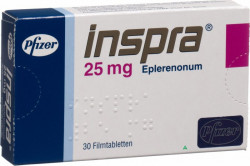Inspra (eplerenone) Coupons, Discounts & Cost
Inspra (eplerenone) is a drug from the group of potassium-sparing diuretics. One way to save money on the Inspra (eplerenone) retail cost regardless of income and insurance status is to use Inspra coupons or discount cards from RXCoupons. Use our Eplerenone coupons at your online pharmacy and receive up to 75% off the sale price each time you refill your prescription.
What do patients need to know about Inspra (eplerenone)?
Inspra (eplerenone) is a drug from the group of potassium-sparing diuretics, which is prescribed for certain pathological processes in the heart.
Indications: - Myocardial infarction (in combination with standard therapy): to reduce the risk of cardiovascular mortality and morbidity in patients with stable left ventricular dysfunction and symptoms of heart failure after myocardial infarction. - Chronic heart failure (in combination with standard therapy): to reduce the risk of cardiovascular mortality and morbidity in patients with chronic heart failure and left ventricular dysfunction.
In what cases patients should NOT take Inspra (eplerenone?
The main contraindications include: hypersensitivity to eplerenone or any other components of the drug, hyperkalemia, moderate or severe renal impairment in patients with chronic heart failure, severe hepatic insufficiency, concomitant use of potassium-sparing diuretics or potent inhibitors of CYP3A4 (such as itraconazole, ketoconazole, ritonavir, nelfinavir, clarithromycin, telithromycin and nefazodone), rare hereditary diseases (such as lactose intolerance, lactase deficiency and glucose-galactose malabsorption).
The drug is not recommended in children under the age of 18.
Use with caution: - Type 2 diabetes; - Elderly patients; - Impaired renal function; - Combined therapy with ACE inhibitors or angiotensin II receptor blockers; preparations containing lithium; cyclosporine or tacrolimus; digoxin and warfarin.
The drug should be used with caution during pregnancy (only in those cases where the expected benefit to the mother is significantly higher than the potential risk to the baby). It is advisable to discontinue breastfeeding or stop taking the drug.
How should patients use Inspra (eplerenone?
Food does not affect the absorption of the drug.
Myocardial infarction: start with a dose of 25 mg once a day and increase it to 50 mg 1 time per day (after 4 weeks). The recommended maintenance dose is 50 mg 1 time per day.
Chronic heart failure: Treatment should be initiated with a dose of 25 mg once a day. Increase the dose up to 50 mg 1 time per day (after 4 weeks). The maximum daily dose is 50 mg.
What are the possible side effects of Inspra (eplerenone?
Hematopoietic system: eosinophilia.
Disorders of metabolism: hyperkalemia, dehydration, hypercholesterolemia, hypertriglyceridemia, hyponatremia, hypothyroidism.
Neurological disorders: dizziness, syncope, insomnia, headache, hypoesthesia.
Heart: myocardial infarction, atrial fibrillation, left ventricular dysfunction, tachycardia.
Vascular disorders: low blood pressure, orthostatic hypotension.
Respiratory system: cough, pharyngitis.
Gastrointestinal tract: diarrhea, nausea, constipation, flatulence, vomiting.
Liver and biliary tract: cholecystitis.
Skin: pruritus, sweating, rash, angioedema.
Musculoskeletal system: musculoskeletal pain, back pain.
Other reactions: asthenia, increased glucose concentration, pyelonephritis, gynecomastia.
Inspra (eplerenone interaction with other drugs
Eplerenone should not be used in patients receiving potassium-sparing diuretics and potassium supplements. Potassium-sparing diuretics may enhance the effects of other antihypertensive agents and diuretics.
Cyclosporine and tacrolimus can cause impaired renal function and increase the risk of hyperkalemia. Nonsteroidal anti-inflammatory drugs (NSAIDs) can lead to acute renal failure, especially in elderly patients and patients with dehydration.
Eplerenone may increase the antihypertensive effect of tricyclic antidepressants, neuroleptics, amifostine, baclofen.
Inspra (eplerenone General recommendations
Patients need to periodically monitor the levels of potassium (before and during the therapy).
The initial dose in elderly patients is the same as in other age groups. The risk of hyperkalemia is higher due to age-related decrease in renal function in elderly patients (especially in the presence of concomitant diseases, in particular with abnormal liver function of mild to moderate severity).
The initial dose in patients with mild renal impairment is the same as in other groups. It is recommended to periodically monitor the levels of potassium in the blood. Patients with heart failure and impaired renal function should begin treatment with a dose of 25 mg every other day. The drug is contraindicated in patients with severe renal insufficiency.
Inspra should be used with caution in patients with heart failure after myocardial infarction.
Patients with impaired hepatic function of mild to moderate severity should not change the doses of the drug. The drug is contraindicated in patients with severe hepatic impairment.

